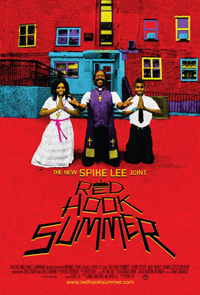Summer Bummer: Lee Offers Strong Ending for the Devoted
 With his first fictional film since 2008’s Miracle at St. Anna, the ever divisive Spike Lee returns with a film he himself personally financed, Red Hook Summer. While it does bear labor of love earmarks, this personal tale that touches on the gentrification of Brooklyn, unfortunately takes an awfully long time to find its voice. With a running time of 130 minutes, the first 90 feel like Lee wants to punish the viewer with a mixture of painfully wooden child actors, and worse, with plenty of unnecessary and wearying church sermons. If you’ve not been to the “good house” for a while, you might feel like you’ve been held hostage to the word by Spike Lee. But if you’ve the patience, Lee has a rewarding payoff in store for you in the film’s final fourth that lessens the load of the barrage of nothing that’s come before.
With his first fictional film since 2008’s Miracle at St. Anna, the ever divisive Spike Lee returns with a film he himself personally financed, Red Hook Summer. While it does bear labor of love earmarks, this personal tale that touches on the gentrification of Brooklyn, unfortunately takes an awfully long time to find its voice. With a running time of 130 minutes, the first 90 feel like Lee wants to punish the viewer with a mixture of painfully wooden child actors, and worse, with plenty of unnecessary and wearying church sermons. If you’ve not been to the “good house” for a while, you might feel like you’ve been held hostage to the word by Spike Lee. But if you’ve the patience, Lee has a rewarding payoff in store for you in the film’s final fourth that lessens the load of the barrage of nothing that’s come before.
Silas Royale (debut of Jules Brown), has traveled with his mother from Atlanta to spend the summer with his grandfather, Enoch (Clarke Peters) in the Red Hook projects of Brooklyn, who is the bishop for the local Baptist Church, Lil Peace of Heaven. Well to do in Atlanta, the petulant Silas, aka Flik, dismisses everything around him, recording his surroundings on his iPad 2, an object his grandfather warns him to be careful with around the projects. It’s made clear that Flik’s mom hasn’t spoken to her father for years and this is the first time Flik has met his grandfather. While this isn’t initially explored, Enoch introduces his grandson to the projects denizens, including a dangerous Blood (Nate Parke), and a young girl named Chazz (Toni Lysaith), whose mother, Sister Sharon (Heather Alicia Simms) has a crush on the bishop. Enoch puts Flik and Chazz to work at the church with the Deacon (a lively Thomas Jefferson Byrd), a gentle alcoholic. But in one compelling and devastating moment, all is revealed about why it is Bishop Enoch no longer speaks with his daughter—and why fled Atlanta for Brooklyn so many years before.
While Flik records the world around us, we see the projects from a privileged (it’s made clear that Flik is a whitewashed character) viewpoint, and perhaps the most intriguing element of the onerous two thirds of the film are how they stack up to Spike Lee’s landscape of urban youth in Do The Right Thing (1989). Though Red Hook Summer is less about race relations than it is about how privilege and class may be the demarcation of the have and have not in today’s world, the film is really about hypocrisy, and even the establishments promising salvation aren’t entirely to be trusted.
In one excellent scene, Heather Alicia Simms has a conversation with Clarke Peters about how it takes a lot more than God to raise children, as she’s determined to raise her youngest as an involved parent after losing the eldest to AIDS. But as a whole, the fiery and passionate performance of Clarke Peters is reason enough to see this film. It’s a pity that the two child leads, Jules Brown and Toni Lysaith, are wooden and amateurish, particularly in scenes just between them (and one wonders if the insistent background music is meant to distract us from them), but Thomas Jefferson Byrd (who also gave a compelling performance as a baddy in Lee’s Clockers, 1995) lightens the load as well.
Lee manages to have put together an excellent soundtrack for the film, culminating in the perfectly used “Want You to Know” by the Freelance Hellraisers at the film’s end. However, the film could have benefited from a three quarters of an hour trim. Be patient—Lee is not simply giving us a sermon because we’re captive in the theater (an obvious poke at Tyler Perry’s work discreetly peeks out of the background in the form of a poster), but he definitely has something to say, and you’ll be listening by the end.
Reviewed on January 23 at the 2012 Sundance Film Festival – PREMIERES Programme. – 130 Mins


